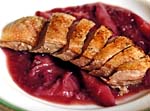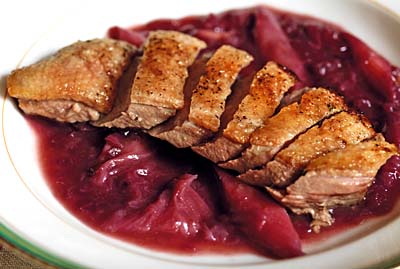Perfect rhubarb recipes
Duck with rhubarb and ginger, and rhubarb with burnt cream are Mark Hix’ suggestions for this versatile fruit


Duck with rhubarb and ginger
Serves 4
The pairing of duck and ginger is a match made in heaven. I'm using a breast of duck for this, but you could use legs and confit them, or use the duck-and-ginger sauce for a whole roast duck.
Ingredients
4 good-quality duck breasts Salt and freshly ground black pepper 1 red onion, peeled, halved and finely chopped A good knob of butter 200g rhubarb, cleaned and cut into 2cm pieces 100ml red wine 80g caster sugar 50g root ginger, scraped and grated 150ml chicken stock 1 tsp cornflour diluted in a little water
Method
Gently cook the red onion in the butter for a couple of minutes on a low heat, stirring occasionally until soft. Add the red wine and caster sugar and boil until it reduces by half. Add the rhubarb and cook over a low heat for 2-3 minutes, stirring carefully every so often, until it's just tender, but not falling apart.
Exquisite houses, the beauty of Nature, and how to get the most from your life, straight to your inbox.
Remove the rhubarb with a slotted spoon and transfer to a plate. Add the ginger and chicken stock to the pan and continue simmering until it's reduced by half. Stir in a little of the cornflour and water until the sauce thickens slightly, and continue simmering gently for 2-3 minutes. Return the rhubarb to the pan and simmer for another minute. The sauce should be quite thick now-if it's not, add a little more cornflour and season.
Meanwhile, season the duck breasts, heat a heavy frying pan and cook the breasts for 2-3 minutes on a medium heat with the skin-side down. Turn them over and cook for another two minutes, flip them over again onto the skin and continue cooking for another couple of minutes until the skin is crisp and the breasts are pink.
If the breasts are large, you can finish them in the oven with the skin-side down, but they should be fine in a pan. Keep an eye on them so they don't overcook.
To serve, slice the breasts into six or seven pieces, spoon the sauce onto warmed serving plates and arrange the duck on top.

Rhubarb burnt cream
Serves 4
Is this delicious pudding French or English in origin? It's difficult to say, as burnt cream seems to have been around for as long as crème brûlée. It may even have been that both were derived from crema catalana. They are all ways with custard, and whoever had the idea of putting a mirror of burnt sugar on top deserves our eternal gratitude.
This creamy pudding is often referred to as Trinity pudding or Trinity cream after the Cambridge college, and to this day, its kitchen serves a version of the dish. It's believed the recipe originally came from an Aberdeenshire country house, and was offered to the college in the 19th century by an undergraduate.
Earlier recipe books of the 1700s refer to a similar pudding as well, but I suppose, at the end of the day, it's just a simple yet decadent way to use up excess eggs and cream.
Ingredients
200g rhubarb, washed and chopped into 2cm pieces 150g golden caster sugar, plus another 75g to glaze 600ml thick Jersey cream 8 egg yolks
Method
On the day before you want to serve the dessert, bring the cream to the boil and reduce by one third. Meanwhile, mix the egg yolks with one tablespoon of the 75g of caster sugar. Pour the reduced cream onto the egg yolks and mix well. Return the mixture to the pan and cook over a low heat, stirring constantly and without allowing it to boil, until the mixture coats the back of a spoon.
Remove from the heat. Meanwhile, put the rhubarb in a pan with the 150g of sugar and cook on a low heat for 4-5 minutes, stirring every so often, until the rhubarb is tender.
Transfer to a bowl. If the liquid is very runny, return it to the pan and simmer until it's reduced down to a tablespoon or so, then pour back into the rhubarb and leave to cool. Spoon into one large or four individual heatproof dishes, such as ramekins, and pour the cream mixture on top and leave to cool overnight in the fridge.
An hour before serving, sprinkle an even layer of caster sugar over the cream and caramelise under a preheated hot grill or with a blowtorch.
Mark Hix's ‘Seasonal Food' is available from Quadrille at £25
Country Life is unlike any other magazine: the only glossy weekly on the newsstand and the only magazine that has been guest-edited by His Majesty The King not once, but twice. It is a celebration of modern rural life and all its diverse joys and pleasures — that was first published in Queen Victoria's Diamond Jubilee year. Our eclectic mixture of witty and informative content — from the most up-to-date property news and commentary and a coveted glimpse inside some of the UK's best houses and gardens, to gardening, the arts and interior design, written by experts in their field — still cannot be found in print or online, anywhere else.
